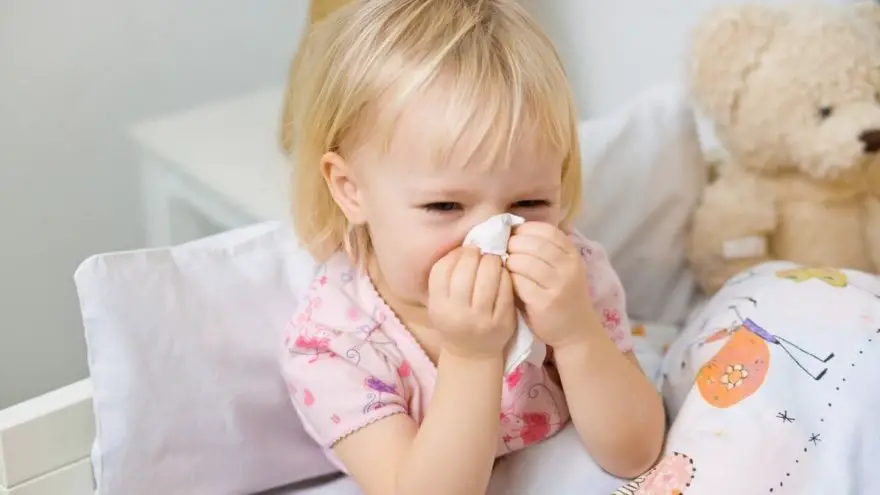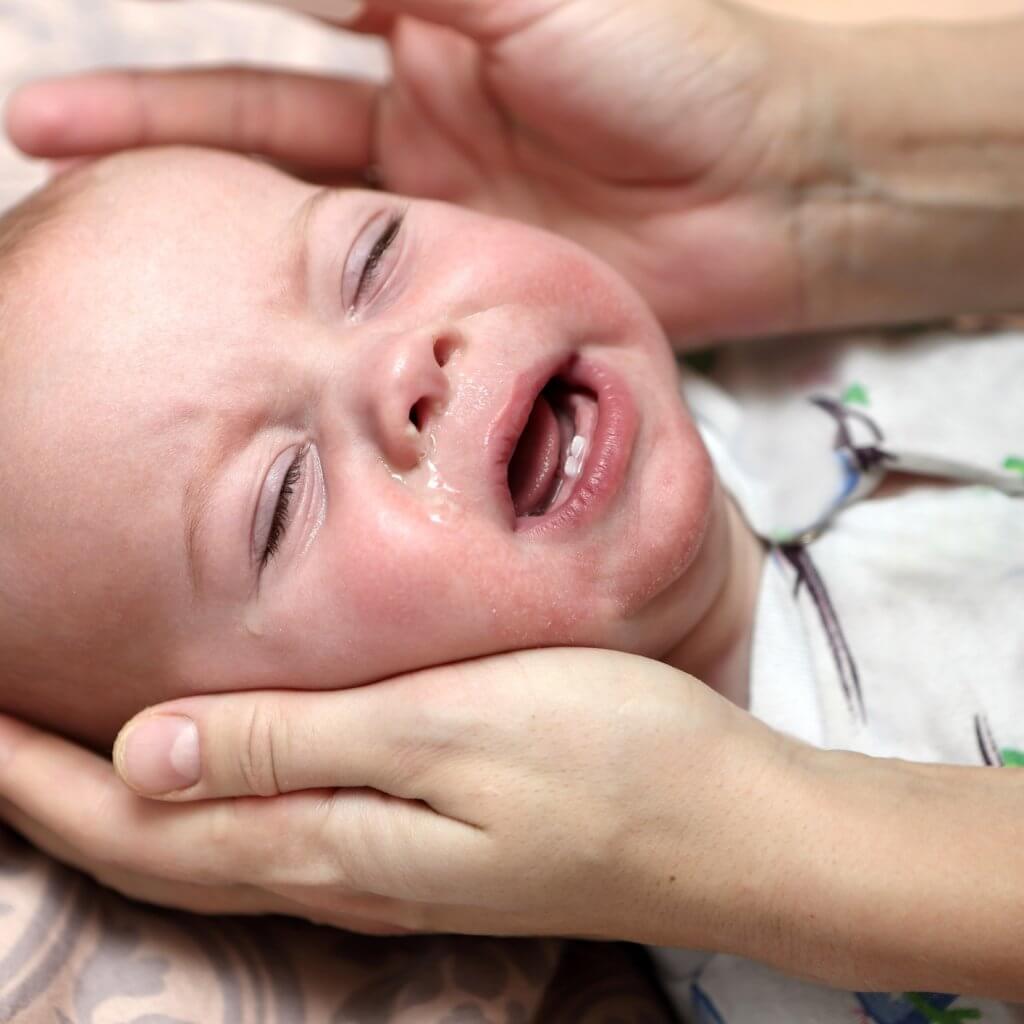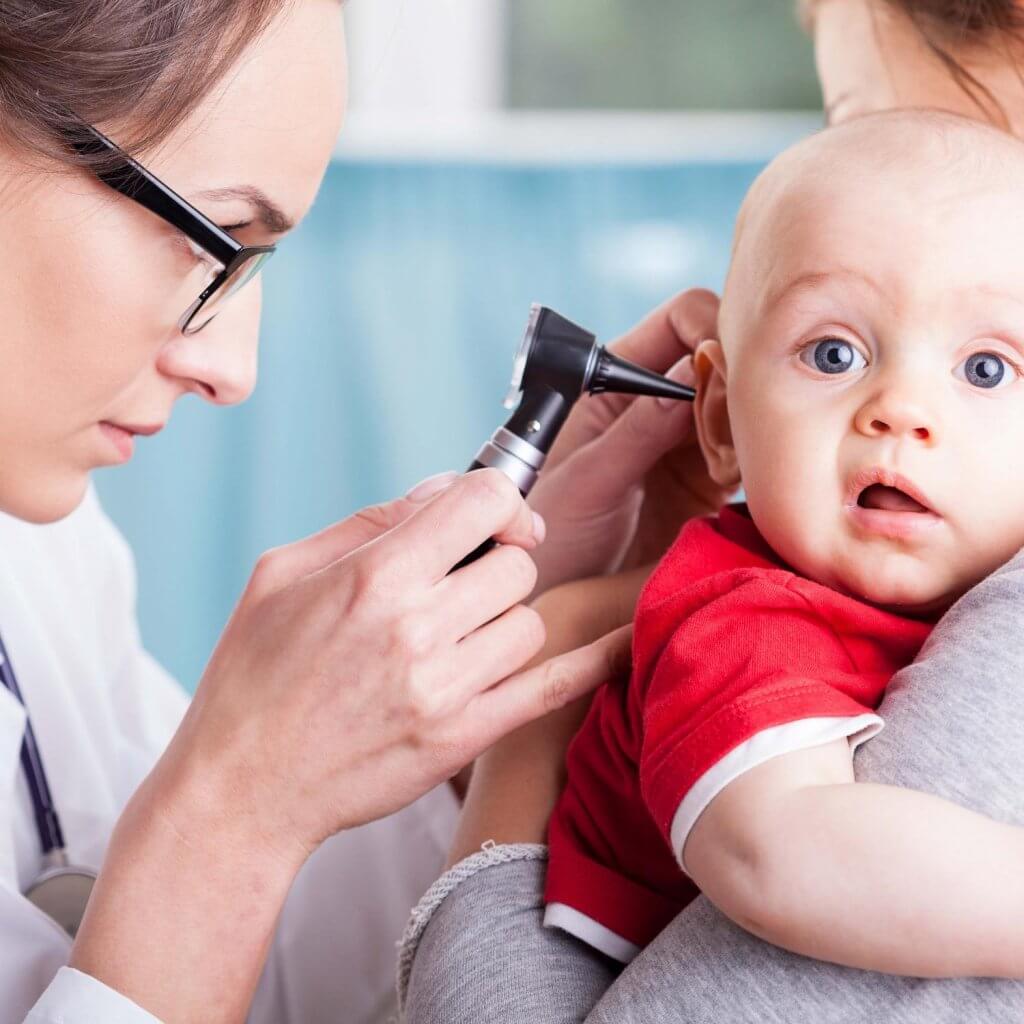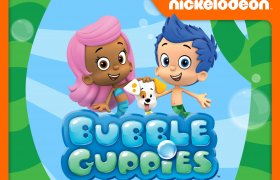Helping a Baby Feel Better Through a Cold

Adults feel awful when they have a common cold, sniffles, fevers, and the like. With that said, most adults either go see the doctor, use holistic medicine, or buy some NyQuil over the counter and cook up some homemade chicken soup to help on the healing path. Now imagine how your baby feels when he or she has a cold that she can’t do anything about?
Babies have to depend on their parents to nurse them back to health, but how do you even know if they have a cold? If they could speak, it would be easier, but since they can’t, here are some common symptoms that your baby has a cold, and how to handle them. Keep in mind that younger infants under two months old should see a physician at the first sign of any of these symptoms as they are more susceptible to illnesses such as croup, pneumonia, or another serious illness. If there are any questions, be sure to contact their pediatrician, that is what they are there for.
Congested or Runny Nose
It is pretty easy to tell when your baby has a runny nose or is congested. Using a rubber nose suction implement is a good way to clear their poor little noses, but beware, they will not be happy about it. Depending on their age and weight, you may be able to get some over the counter children’s medicine for congestion.
Also, there are saline solutions available to help with their nose congestion, but checking with their doctor first before administering any type of medicine should be top priority.

Fevers
If your baby is suddenly hot to the touch, do not be surprised as fevers are a normal occurrence in babies. Check their temperature with a rectal thermometer, as they are the most accurate. An often used activity is to bring their temperatures down with a cool bath, or wiping them down with cool water.
Depending on their temperature and their age, you may be able to treat them with acetaminophen (aspirin), but the younger they are and the higher the temperature, contacting a physician is the best course of action, especially if they are under four months old.
Coughing
Everyone has heard a baby cough, but when it sounds like a seal, time to call the doctor because it could be croup or something even more serious. If it just sounds like a normal cough, then there are other alternatives. Having a humidifier in their room can help lessen the cough, especially in areas that have dry air or in the winter because the air is drier in the wintertime.
A cool mist humidifier can help put some moisture in the air and help your baby’s cough during nap time or bedtime. Vicks vaporizers work the same way, they can help keep the congestion and cough to a minimum by keeping their lungs clear with the vaporizing. Another good tip is not to turn the heat up too high during the dry months, keeping it around 70-72 degrees is a comfortable number.
Another good idea for a cough and congestion is to have a steam room. Remember the old days when your Grandmother would heat up some water and have you put your head over it with a towel? The modern day trick would be to turn on the hot water in the bathroom, let it steam up the room, this will help to loosen baby’s congestion and quiet their cough.
Ear Infection
If your baby is showing signs of runny nose, or stuffy nose, but is also pulling on their ears, it could be an ear infection. While there maybe be ear drops you can use, it is still best to contact the pediatrician. They will probably need an antibiotic as well as ear drops, and the doctor can tell you for sure if they have an ear infection or if there is a different problem.

Sneezing and Shallow Breathing
Your little one sneezes, it sounds cute, but it really isn’t. Sneezing could just be an allergy, or some dust got into their little noses, but when it comes with breathing that doesn’t sound normal, time to take notice.
Shallow breathing could indicate that they are congested, and again, depending on their age-seeking treatment from a medical physician should not be out of the question. Pneumonia in babies can happen and does, so it’s better to be safe than sorry when dealing with breathing that doesn’t seem normal, not to mention all of the other ailments that could attack your little one. Just err on the side of caution.
While the ones listed here are fairly common in recognizing a cold in a baby, there are other symptoms that should be watched for when dealing with a baby that has a cold. Your baby may or may not exhibit some of these symptoms, but it’s better to be prepared and know what to watch out for.
- Dry Diapers
- Diarrhea
- Unable to nurse or bottle feed possibly due to congestion
- Lethargy
- Irritability
- Not sleeping much
- Sleeping too much
- Red eyes or green/yellow eye discharge
- Vomiting
Providing your baby is otherwise happy and healthy, a common cold could last a week or more because a babies immune system isn’t like an adult’s, and it takes longer for their immune systems to fight off viruses. Even with prescribed medication from a doctor, it could still take their little bodies longer to feel better.
When you know you have a sick baby on your hands, keep a look out for the more severe symptoms, if they exhibit any of them, contact your physician immediately.
- Will not eat or nurse at all
- Coughing hard enough to vomit
- Coughing up blood sputum
- Trouble breathing
- Blue tint around the lips
- Bloody diarrhea
- Discoloration of the skin
- Dehydration
- Yellow-tinged skin
While the internet can be a wonderful source of information, too many people rely on it as their only source of information. Parenting classes, speaking with your physician, getting second opinions if needed, using other resources can prove to be beneficial–do not rely on the various medicals sites that are found online.
Remember that all babies are different and may never show any of these symptoms or may show all of them, being prepared is a parent’s best defense. Always talk to your doctor about possibilities and what actions you should take under certain circumstances. By being prepared and knowledgeable against any or all ailments, your baby can be happy and healthy during their development and growth without lingering effects.
Many things in life are inevitable, and without a doubt, your baby may end up with at least a cold or two while they are infants. With your help, babies can get through a common cold with a lot of nurturing and love, and understanding what you, as a parent can do to help them out. Pretty soon, you’ll have your gurgling, bright-eyed baby looking as cute and adorable as ever! Break out that camera and go to town, so you have pics to embarrass them with when they become teenagers, you know, the one where they had mashed potatoes all over their face?







